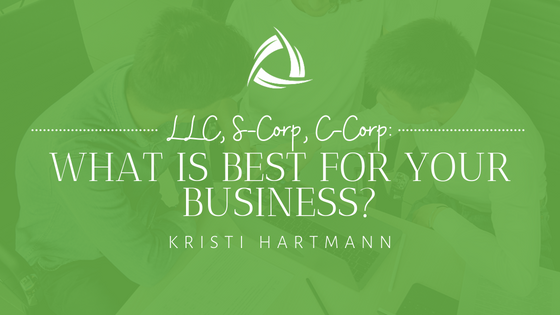Once you have an idea and a plan, building your business can be a very exciting venture, and the last thing you want is to get caught up in the technicalities of choices such as structure. So, within your planning process, it can be wise to decipher which business structure you see yourself gravitating toward so you can take the proper steps to get there.
LLC, S-Corp, and C-Corp are the most common business structures that come to mind for early entrepreneurs. As you prepare to build your legacy, here is some insight into what structure might be best for your business.
Find What Works Best
Each option comes with its own reasons for choosing it. Every business is different and has different needs. When selecting a structure, getting a second perspective from someone like a business attorney can be important to ensure you are taking the proper steps.
An LLC…
An LLC allows you to obtain personal liability protection within your business, meaning it protects your personal assets, and taxes are still reported through your individual tax returns. This structure can be best for simple businesses where you are the only owner without worrying about shareholders or significant tax issues.
An LLC can be great for businesses that…
- Own real estate.
- Foresee loss in the first couple of years of opening.
- Have flexible accounting measures in place.
- Want flexible management.
Structuring your business as an LLC allows for less paperwork, asset protection, unlimited members, and simpler taxes.
An S-Corp…
An S-Corp is more of a tax status than a business structure. You can elect the S-Corp status if you have filed under a corporation. This might be best for businesses that are becoming more complex and profitable.
S-Corps are pass-through entities, meaning that any profits made in the business pass through the owner’s personal income, and then owners can withdraw those profits as tax-free dividends.
An S-Corp can be great for businesses that…
- Want the benefits of a business corporation and the advantage of pass-through taxation.
- Structuring your business as an S-Corp can be beneficial during tax season.
A C-Corp…
Like the other two options, choosing a C-Corp can benefit from taxes, but a C-Corp does it differently. With this choice, your profits can be kept within the business, also known as retained earnings. You can decide what you pay yourself and what goes back into the business, and these retained earnings are tax-exempt.
A C-Corp might be forced onto a business if it has more than 100 shareholders or requires a different share class structure. One downside of a C-Corp is the double taxation that occurs. A C corporation must pay tax on its income first, and then the remaining money will be divided amongst the owners, who are also taxed on it.
A C-Corp can be great for businesses that need…
- Flexible profit sharing among owners.
- The ability to offer stock options to employees.
- Flexibility to provide health and medical benefits.
- Venture capital for financing.
- Company earnings to stay within the business.
Structuring your business as a C-Corp is more common in large publicly traded companies or high-growth start-up companies seeking funding.
Choosing your business’s structure is important to its future success. Pick the right one with the help of the team at Hartmann Law.

